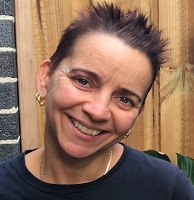Responsibility Coach
After a successful career in professional development, Ange was made redundant from a company she loved. She was terrified and excited, but knew she had been given an opportunity to follow her dreams and to support others to do the same. Coaching was the next logical step for her.
1. When did you first know you wanted to become a coach?
A few years back I was made redundant from a company that I loved. I was forced to take stock of my life, re-evaluate where I was and to honestly consider what was important to me.
I realised I had been restless in my role for years. I had felt trapped by the job title, heavy mortgage and the sense of loyalty I felt towards the boss. Even though I had achieved great things I still felt like I was missing something in life.
While I was reflecting on that, I realised that there had been moments spent with my colleagues when I just couldn't contain the energy, excitement and pure joy I felt while working with these amazing individuals that trusted me each day. I realised that when I was connected to them, when I had the opportunity to train, mentor and coach them to achieve better outcomes in their work and personal lives, I was energised, focused, engaged, alive and in flow.
my eyes were opened to the power of coaching and I knew without question that I wanted to focus on becoming a coach.
So, although I was terrified and excited, I knew I had been given an opportunity to take my own medicine, follow my dreams and achieve my own goals as I had so strongly supported others to do.
I decided to complete a Diploma of Positive Psychology and it was during this program that my eyes were opened to the power of coaching and I knew without question that I wanted to focus on becoming a coach.
2. When did you discover your niche, and then how did you use it to find clients?
Like so many other coaches, I had multiple areas of interest and multiple areas of expertise. I started off wanting to be a health and wellness coach because my own wellness journey had been so important to me. But I soon realised that this niche was too broad. I also realised I was focusing on me, and not on my potential clients. So I asked myself the questions “What problems do I work well with?” and “Who do I naturally attract” I realised I worked well with women who are a little bit like me.
I was someone who had good knowledge and skills. I was achieving goals and had some relative success in life yet I was somehow just missing the mark. I began to focus on why this was happening and as a result I found my niche. By sharing my own journey I have been able to find clients in a similar situation.
3. Who are your clients (or who are you planning they will be?)
I work with successful women who are kicking goals in many areas of their life, have good skills but for some reason are not achieving the results they want. I help them to take things to the next level.
4. How have you blended coaching with your previous experience or profession?
I have had over 25 years of personal and professional development experience as well as a Diploma in Positive Psychology. These skills have definitely helped shape me and my style of coaching.
Currently I am working on a project for Cherbourg Aboriginal Shire in the north of Australia. I am helping them design and implement a Health and Safety Management system. I am using my coaching and mentoring them to implement this system into their day to day work practices.
I am also a passionate photographer and I plan on developing a course that blends photography and coaching. I am interested in the way people “see” and “frame” their lives and I think photography can be a window into self-development.
5. What is / was your experience as a student of ICA?
ICA was my first choice for a coaching school. I actually researched for six months and was constantly drawn back to their programs. But, the fact that ICA requires you to create your own coaching model was a little bit daunting to me so I chose a different school. I ended up spending thousands of dollars and seven months to be drip fed information that was read from notes and was based on that school's model. It was frustrating and not empowering for me. At the end of that program I came back to ICA. I have been on a journey with ICA that has both expanded me as a person and as a coach. Developing my own coaching model has been the most significant aspect of this experience. I'm incredibly grateful it happened.
6. What's a typical day for you as a coach or as a student?
My days are pretty flexible and because I combine coaching with projects, I travel a bit and no two days are the same. Here are the activities I do most days – but the great thing about coaching is that my schedule is my own and I often swap it around depending on how I’m feeling.
• meditate
• exercise (currently boxing and pilates)
• make breakfast (always eggs)
• catch up on admin
• work on my coaching business or with scheduled clients
• more exercise
• work on my blog or social media
• see bands and live music, catching up with family and friends
• watch the footy
